Kenneth C. Davis's Blog, page 3
May 19, 2025
The Divisive & Partisan History of “Memorial Day”

Tomb of the Unknown Soldier (Photo: Arlington National Cemetery) This memorial was created after the great losses of World War I.
(Post updated May 19, 2025)
America’s most solemn holiday should be free of rancor. But it never has been.
Army bases honoring Confederates that were renamed during the Biden administration are being renamed once more by a
According to Stars and Stripes,“Trump’s choice for Defense Secretary, Pete Hegseth, a former Fox New host who served combat tours in Iraq and Afghanistan as an Army National Guard officer, is among those who have criticized the changes. In interviews, he has called the effort ‘a sham,’ ‘garbage,’ and urged officials to ‘change it back.’”
Source –
But the Confederate Monument in Arlington Cemetery was removed in 2023 and relocated. A contentious statue of Robert E. Lee in Richmond–onetime capital of the Confederacy– has been removed. And another statue of Lee has been melted down.
These heated arguments over removing the Confederate flag and monuments to heroes and soldiers of the Confederacy provide reminders of the birth of Memorial Day.

In the Korean War, the U.S. military was integrated. (Source: Library of Congress)
Waterloo, New York claimed that the holiday originated there with a parade and decoration of the graves of fallen soldiers in 1866. But according to the Veterans Administration, at least 25 places stake a claim to the birth of Memorial Day. Among the pack are Boalsburg, Pennsylvania, which says it was first in 1864.( “Many Claim to Be Memorial Day Birthplace” )
And Charleston, South Carolina, according to historian David Blight, points to a parade of emancipated children in May 1865 who decorated the graves of fallen Union soldiers whose remains were moved from a racetrack to a proper cemetery.
Born out of the Civil War’s catastrophic death toll as “Decoration Day,” Memorial Day is a day for honoring our nation’s war dead. A veteran of the Mexican War and the Civil War, John A. Logan, a Congressman and leader of the Grand Army of the Republic, established the first somber commemoration on May 30, 1868, in Arlington Cemetery, the sacred space wrested from property once belonging to Robert E. Lee’s family.( When Memorial Day was No Picnic by James M. McPherson.) The Grand Army of the Republic was a powerful fraternal organization formed of Civil War Union veterans and Logan issued “General Order N.11” calling for a day to decorate the graves of the fallen Union soldiers with flowers.
What can aid more to assure this result than cherishing tenderly the memory of our heroic dead, who made their breasts a barricade between our country and its foes? Their soldier lives were the reveille of freedom to a race in chains, and their deaths the tattoo of rebellious tyranny in arms. We should guard their graves with sacred vigilance.

Abraham Lincoln (November 1863) Photo by Alexander Gardner
From its inception, Decoration Day (later Memorial Day) was linked to “Yankee” losses in the cause of emancipation. Calling for the first formal Decoration Day, Union General John Logan wrote, “Their soldier lives were the reveille of freedom to a race in chains…”
In other words, Logan’s first Decoration Day was divisive— a partisan affair, organized by northerners.
In 1871, Frederick Douglass gave a Memorial Day speech in Arlington that focused on this division:
We are sometimes asked, in the name of patriotism, to forget the merits of this fearful struggle, and to remember with equal admiration those who struck at the nation’s life and those who struck to save it, those who fought for slavery and those who fought for liberty and justice.
I am no minister of malice. I would not strike the fallen. I would not repel the repentant; but may my “right hand forget her cunning and my tongue cleave to the roof of my mouth,” if I forget the difference between the parties to that terrible, protracted, and bloody conflict.

But the question remains: what inspired Logan to call for this rite of decorating soldier’s graves with fresh flowers?
The simple answer is—his wife.
After the war, while visiting Petersburg, Virginia – which fell to General Grant in 1865 after a deadly, year-long siege – Mary Logan learned about the city’s women who had formed a Ladies’ Memorial Association. Their aim was to show admiration “…for those who died defending homes and loved ones.”
Choosing June 9th, the anniversary of “The Battle of the Old Men and the Young Boys” fought in 1864, a teacher had taken her students to the city’s cemetery to decorate the graves of the fallen.
General Logan’s wife wrote to him about the practice. Soon after, he ordered a day of remembrance. Despite all the other claims of credit –which are somewhat besides the point– Petersburg’s celebration inspired the “first” Decoration Day.
The teacher and her students, it is worth noting, had placed flowers and flags on both Union and Confederate graves.As America wages its partisan wars at full pitch, this may be a lesson for us all.
More resources at the New York Times Topics archive of Memorial Day articles
The story of “The Battle of the Old Men and the Young Boys” is told in THE HIDDEN HISTORY OF AMERICA AT WAR (Now in paperback)
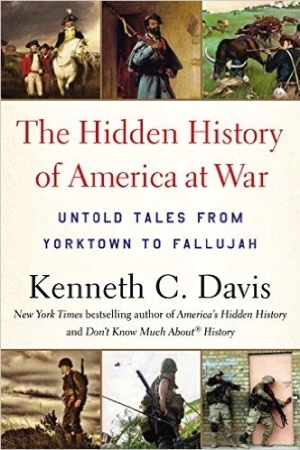
Now In paperback THE HIDDEN HISTORY OF AMERICA AT WAR: Untold Tales from Yorktown to Fallujah
The post The Divisive & Partisan History of “Memorial Day” first appeared on Don't Know Much.
In the Shadow of Liberty
[Post revised May 19, 2025]
In the current political landscape, teaching an accurate version of American History is under assault.
As the New York Times reported recently,
“Recent polls show that a majority of Americans of all political stripes are open to complex history that shows the bad along with the good. But Mr. Trump’s recent actions, some observers say, are part of an escalating attempt to use history as a wedge that separates ‘real’ Americans from naysayers who threaten the body politic.” New York Times, April 19, 2025, “Trump’s American History Revolution”
Having spent much of my career trying to correct the false narrative so many Americans were once taught, I believe the nation must honestly confront the role that enslavement played in the nation’s founding and development. In the Shadow of Liberty tells that story.
Did you know that many of America’s Founding Fathers—who fought for liberty and justice for all—were slave owners?
Through the powerful stories of five enslaved people who were “owned” by four of our greatest presidents, this book helps set the record straight about the role slavery played in the founding of America. These dramatic narratives explore our country’s great tragedy—that a nation “conceived in liberty” was also born in shackles.
BILLY LEE, who became George Washington’s valet and fought in the American Revolution alongside him.ONA JUDGE, who escaped from Washington’s Philadelphia household—only to be tracked down by the president’s men.ISAAC GRANGER, who survived the devastation of Yorktown before returning to Thomas Jefferson’s Monticello.PAUL JENNINGS, who was present at the burning of James Madison’s White House during the War of 1812.ALFRED JACKSON, who was born into slavery at Andrew Jackson’s Hermitage, survived the Civil War, and lived at the plantation into the 20th century.

The post In the Shadow of Liberty first appeared on Don't Know Much.
February 17, 2025
The World in Books-Now Available
A YEAR OF READING–WISELY
THE WORLD IN BOOKS:
52 Works of Great Short Nonfiction
Named to “The Most Anticipated: The Great Fall 2024 Preview” by The Millions
“Kenneth C. Davis’s The World in Books is a testament to both the beauty and power of the written word. And also, a very smart guide to books that have changed the way we think – and sometimes even changed us.”
–Deborah Blum, Pulitzer-Prize winning author of The Poison Squad and the bestseller, The Poisoner’s Handbook.
First Trade review from Kirkus Reviews
“A wealth of succinct, entertaining advice.” Full review
Now out from Scribner Books and Simon & Schuster Audio
Read more and order copies here.
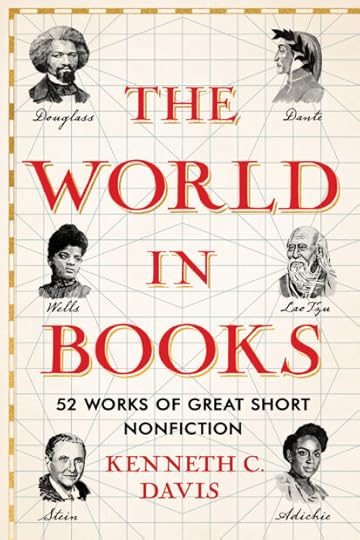
More advance Praise for The World in Books:
“In his accessible, well-written, and unanticipatedly humorous The World in Books, Kenneth C. Davis takes readers on a journey that highlights fifty-two short yet provocative works of non-fiction. Highlighting both traditional favorites and contemporary classics, Davis offers his sharp insights in ways that appeal to the inquisitive mind, regardless of its familiarity with the selected texts. His poignant “Introduction” sets the stage for the contemporary relevance of why books like these matter in contemporary times, which makes this collection all the more relevant. Highly recommended for every person who treasures the freedom to read and values the transformative power it has for us all.”
—Dr. J. Michael Butler, Kenan Distinguished Professor of History, Flagler College and author of Beyond Integration
What a “Year of Reading–Wisely” looks like….
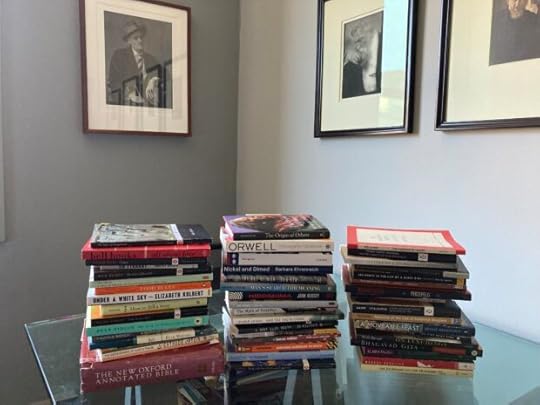
Photo credit Kenneth C. Davis
Among the 52 titles I have included are The Epic of Gilgamesh, Genesis, the poetry of Sappho, Meditations by Marcus Aurelius, and such profoundly influential writers as Frederick Douglass, Henry David Thoreau, Virginia Woolf, Helen Keller, James Baldwin, Susan Sontag, and Timothy Snyder.
The essential message of this book is that books matter–now more than ever. We must continue to educate ourselves. I believe that Open Books Open Minds.
I look forward to talking about this book in the coming months and sharing my fundamental belief that books can change us and the world.
In the meantime, please read and enjoy Great Short Books: A Year of Reading–Briefly
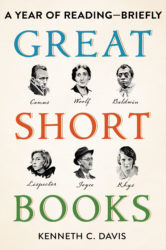
The post The World in Books-Now Available first appeared on Don't Know Much.
February 11, 2025
It is NOT Presidents Day. Or President’s Day. Or Even Presidents’ Day.
(Earlier post updated 2/11/2025)
We approach Abraham Lincoln’s actual birthday–February 12– and we are heading towards a three-day holiday.
So What Day Is it After All?
Okay. We all do it. It is printed on calendars and posted in bank windows. We mistakenly call the third Monday in February Presidents Day, in part because of all those commercials in which George Washington swings his legendary ax and “Rail-splitter” Abe Lincoln hoists his ax to chop down prices on everything from mattresses and linens to SUVs.
But, this February holiday is officially still George Washington’s Birthday.
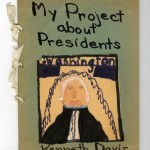
I wrote My Project About Presidents in 3rd Grade when I was 9. Even then I was asking questions about history and presidents
But Washington’s Birthday has become widely known as Presidents Day (or President’s Day, or Presidents’ Day). The popular usage and confusion resulted from the merging of what had been two widely celebrated Presidential birthdays in February —Lincoln’s on February 12th, which was never a federal holiday– and Washington’s on February 22, which was.
Created under the Uniform Holiday Act of 1968, which gave us three-day weekend Monday holidays, the federal holiday on the third Monday in February is technically still Washington’s Birthday. But here’s the rub: the holiday can never land on Washington’s true birthday because the latest date it can fall is February 21, as it did in 2011.
But we cannot discuss Washington, Lincoln, the presidency, or much of United States history without discussing the role that slavery played in the foundation and establishment of the republic.
READ MY ARTICLE in Social Education: “The American Contradiction: Conceived in Liberty, Born in Shackles”
George Washington’s role as an enslaver is fully explored in my book IN THE SHADOW OF LIBERTY: The Hidden History of Slavery, Four Presidents, and Five Black Lives. 
There is a wealth of information about the First President at his home Mount Vernon.

Washington’s Tomb — Mt. Vernon (Photo credit Kenneth C. Davis 2010)
And read More About the creation of the Presidency, Washington, his life and administration in DON’T KNOW MUCH ABOUT® THE AMERICAN PRESIDENTS. Washington’s role in the American Revolution is highlighted Chapter One of THE HIDDEN HISTORY OF AMERICA AT WAR.

The Hidden History of America At War (paperback)

Don’t Know Much About® History: Anniversary Edition
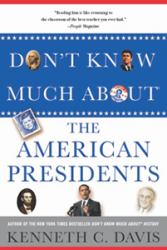
Don’t Know Much About® the American Presidents (Hyperion paperback-April 15, 2014)
The post It is NOT Presidents Day. Or President’s Day. Or Even Presidents’ Day. first appeared on Don't Know Much.
February 5, 2025
In the Shadow of Liberty
As we enter Black History Month in February 2025, teaching an accurate version of American History is under assault. The nation must honestly confront the role that enslavement played in the nation’s founding and development. In the Shadow of Liberty tells that story.
Did you know that many of America’s Founding Fathers—who fought for liberty and justice for all—were slave owners?
Through the powerful stories of five enslaved people who were “owned” by four of our greatest presidents, this book helps set the record straight about the role slavery played in the founding of America. These dramatic narratives explore our country’s great tragedy—that a nation “conceived in liberty” was also born in shackles.
BILLY LEE, who became George Washington’s valet and fought in the American Revolution alongside him.ONA JUDGE, who escaped from Washington’s Philadelphia household—only to be tracked down by the president’s men.ISAAC GRANGER, who survived the devastation of Yorktown before returning to Thomas Jefferson’s Monticello.PAUL JENNINGS, who was present at the burning of James Madison’s White House during the War of 1812.ALFRED JACKSON, who was born into slavery at Andrew Jackson’s Hermitage, survived the Civil War, and lived at the plantation into the 20th century.

The post In the Shadow of Liberty first appeared on Don't Know Much.
January 20, 2025
Whatever Became of Thomas Paine?
–Thomas Paine, The American Crisis (December 19, 1776)
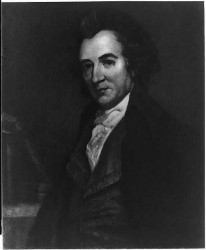
Thomas Paine ©National Portrait Gallery London copy by Auguste Millière, after an engraving by William Sharp, after George Romney oil on canvas, circa 1876
[Originally posted December 2020; revised 1/20/2025]
Thomas Paine was born in England on January 29, 1736 (in the Old Style; his birth-date is also listed as February 9, 1737 in the New Style). Thomas Paine’s essay Common Sense is widely credited with helping to rouse Americans to the patriot cause. Its sales were extraordinary at the time; given today’s American population, current day sales would reach some 60 million copies.
Of more worth is one honest man to society and in the sight of God, than all the crowned ruffians that ever lived.
-Thomas Paine Common Sense
Text via Thomas Paine National Historical Association
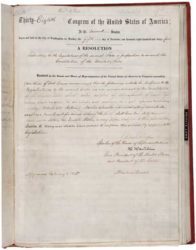
Common sense; addressed to the inhabitants of America, on the following interesting subjects (Library of Congress)
The pamphleteering Paine is best known for Common Sense, which appeared in January 1776 and The Crisis — first published on December 19 1776 — among other works that supported the cause of independence. But after the Revolution, Paine returned to his native England and later went to France, then in the throes of its Revolution.
Paine was caught up in the complex politics of the bloody Revolution there, eventually winding up in a French prison cell, facing the prospect of the guillotine. After eventually being freed, Paine wrote an open letter in 1796 angrily denouncing President George Washington for failing to do enough to secure his release.
“Monopolies of every kind marked your administration almost in the moment of its commencement. The lands obtained by the Revolution were lavished upon partisans; the interest of the disbanded soldier was sold to the speculator…In what fraudulent light must Mr. Washington’s character appear in the world, when his declarations and his conduct are compared together!”
Source: George Washington’s Mount Vernon
This was a serious case of bridge-burning and Paine swiftly fell from grace in America. But apart from dissing the Father of the Country, Paine had also fallen from favor for his most famous work after Common Sense. In 1794, he had published The Age of Reason (Part I), a deist assault on organized religion and the errors of the Bible.
In it, Paine had written:
I do not believe in the creed professed by the Jewish church, by the Roman church, by the Greek church, by the Turkish church, by the Protestant church, nor by any church that I know of. My own mind is my own church.
All national institutions of churches, whether Jewish, Christian or Turkish, appear to me no other than human inventions, set up to terrify and enslave mankind, and monopolize power and profit.
(Source: USHistory.org)
After returning to the United States, which owed so much to him, Paine was regarded as an atheist and was abandoned by most of his friends and former allies. He died in disgrace, an outcast from the United States he had helped create. The Quaker church he had rejected refused to bury him after he died in Greenwich Village (New York City) in 1809. He was buried on his farm in New Rochelle, New York. A handful of people attended his funeral.
An admirer brought his remains back to England for reburial there, but they were lost.
Today he is honored in New York City by a small park named in his honor.
“This park in the heart of New York City’s civic center is named for patriot, author, humanitarian, and political visionary Thomas Paine (1737-1809). The land that is now Thomas Paine Park was once part of a freshwater swamp surrounded, ironically, by three former British prisons for revolutionaries.
His most famous work, Rights of Man (1791), was written after the French Revolution and proposes that government is responsible for protecting the natural rights of its people. Many of Paine’s ideas were strikingly far sighted. He advocated for the abolition of slavery, defended freedom of thought and expression, and proposed an association of nations to avert the spread of conflicts.”
You can read more about Thomas Paine, his relationship with Washington and his ultimate fate in Don’t Know Much About History and Don’t Know Much About the American Presidents.
Paine’s book, The AGE OF REASON, is among 52 short works of nonfiction included in THE WORLD IN BOOKS.

The post Whatever Became of Thomas Paine? first appeared on Don't Know Much.
January 15, 2025
The World in Books-Now Available
A YEAR OF READING–WISELY
THE WORLD IN BOOKS:
52 Works of Great Short Nonfiction
Named to “The Most Anticipated: The Great Fall 2024 Preview” by The Millions
First Trade review from Kirkus Reviews
“A wealth of succinct, entertaining advice.” Full review
Now out from Scribner Books and Simon & Schuster Audio on October 8, 2024. Read more and preorder copies here.

More advance Praise for The World in Books:
“Kenneth C. Davis’s The World in Books is a testament to both the beauty and power of the written word. And also, a very smart guide to books that have changed the way we think – and sometimes even changed us.”
–Deborah Blum, Pulitzer-Prize winning author of The Poison Squad: One Chemist’s Single-Minded Crusade for Food Safety at the Turn of the Twentieth Century and the bestseller, The Poisoner’s Handbook.
“In his accessible, well-written, and unanticipatedly humorous The World in Books, Kenneth C. Davis takes readers on a journey that highlights fifty-two short yet provocative works of non-fiction. Highlighting both traditional favorites and contemporary classics, Davis offers his sharp insights in ways that appeal to the inquisitive mind, regardless of its familiarity with the selected texts. His poignant “Introduction” sets the stage for the contemporary relevance of why books like these matter in contemporary times, which makes this collection all the more relevant. Highly recommended for every person who treasures the freedom to read and values the transformative power it has for us all.”
—Dr. J. Michael Butler, Kenan Distinguished Professor of History, Flagler College and author of Beyond Integration
What a “Year of Reading–Wisely” looks like….

Photo credit Kenneth C. Davis
Among the 52 titles I have included are The Epic of Gilgamesh, Genesis, the poetry of Sappho, Meditations by Marcus Aurelius, and such profoundly influential writers as Frederick Douglass, Henry David Thoreau, Virginia Woolf, Helen Keller, James Baldwin, Susan Sontag, and Timothy Snyder.
The essential message of this book is that books matter–now more than ever. We must continue to educate ourselves. I believe that Open Books Open Minds.
I look forward to talking about this book in the coming months and sharing my fundamental belief that books can change us and the world.
In the meantime, please read and enjoy Great Short Books: A Year of Reading–Briefly

The post The World in Books-Now Available first appeared on Don't Know Much.
January 10, 2025
Who Said It? (12/10/2020)
Abraham Lincoln, First Inaugural Address, (Monday March 4, 1861)
Abraham Lincoln, born on February 12, 1809. Resources via Library of Congress

Abraham Lincoln (November 1863) Photo by Alexander Gardner
I have no purpose, directly or indirectly, to interfere with the institution of slavery in the States where it exists. I believe I have no lawful right to do so, and I have no inclination to do so.
*
In your hands, my dissatisfied fellow-countrymen, and not in mine, is the momentous issue of civil war. The Government will not assail you. You can have no conflict without being yourselves the aggressors. You have no oath registered in heaven to destroy the Government, while I shall have the most solemn one to “preserve, protect, and defend it.”
*
I am loath to close. We are not enemies, but friends. We must not be enemies. Though passion may have strained it must not break our bonds of affection. The mystic chords of memory, stretching from every battlefield and patriot grave to every living heart and hearthstone all over this broad land, will yet swell the chorus of the Union, when again touched, as surely they will be, by the better angels of our nature.
Full text of Lincoln’s First Inaugural Address
The post Who Said It? (12/10/2020) first appeared on Don't Know Much.
The Greatest Second Inaugural Address?
(Originally posted January 18, 2013; revised January 10, 2025)
In reflecting on the history of the Presidential Inauguration, I have been re-reading many of the inaugural addresses.
It is safe to say that few of these speeches rise to the level of greatness. My choices for best inaugurals are Lincoln’s first in 1861 (“mystic chords of memory”) and second in 1865 (“with malice toward none”) which both rise to the level of American poetry; and FDR’s first in 1933 (“the only thing we have to fear is fear itself”).
But second inaugurals often have a “Been there, done that” quality. Finding second inaugural speeches that reach greatness is even tougher. George Washington’s second was the shortest ever– a mere 135 words long. In it, he basically said, “I’m going to take the oath again and if I break any laws, you can come after me.”
Lincoln’s second, as mentioned above, is among the greatest American speeches. President Lincoln showed how he had moved from preserving the Union to ending slavery:
Yet, if God wills that it continue until all the wealth piled by the bondsman’s two hundred and fifty years of unrequited toil shall be sunk, and until every drop of blood drawn with the lash shall be paid by another drawn with the sword, as was said three thousand years ago, so still it must be said “the judgments of the Lord are true and righteous altogether.”
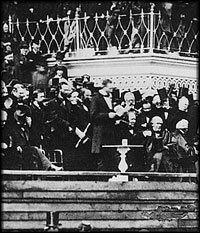
Abraham Lincoln’s Second Inaugural (March 4, 1865) Photo Courtesy of the Library of C0ngress
My other favorite is Franklin D Roosevelt’s second inaugural address in 1937. Like Lincoln assaulting slaveholders, Franklin D. Roosevelt did not shy away from taking on the powerful interests that he felt had brought the nation into the Great Depression:
We are beginning to abandon our tolerance of the abuse of power by those who betray for profit the elementary decencies of life.
And the speech includes one of his most memorable phrases as FDR spoke of the great inequity that still existed in America:
I see one-third of a nation ill-housed, ill-clad, ill-nourished.
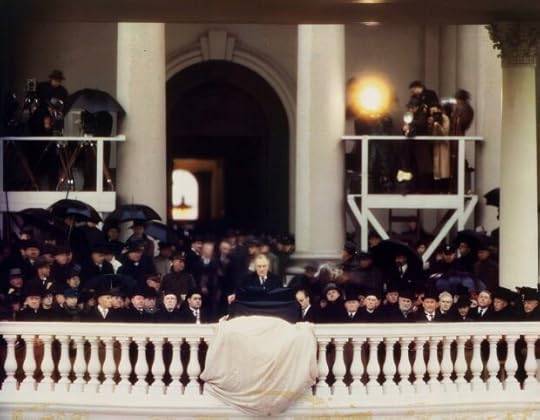
Franklin D. Roosevelt’s Second Inaugural January 20, 1937 Public Domain Photo Courtesy of National Portrait Gallery https://npg.si.edu/object/npg_NPG.97.134
FDR’s idea of government being able to protect the people has fallen out of fashion in many circles. But anyone who wants a good example for a second inaugural address, might look at how Franklin D. Roosevelt set the bar.
The post The Greatest Second Inaugural Address? first appeared on Don't Know Much.
December 24, 2024
“On the Power of Reading”–CBS Mornings Interview
{"@context":"http:\/\/schema.org\/","@id":"https:\/\/dontknowmuch.com\/2024\/12\/on-the-power-of-reading-cbs-mornings-interview\/#arve-youtube-t6nl_gp9xfw","type":"VideoObject","embedURL":"https:\/\/www.youtube-nocookie.com\/embed\/T6nL..."}
I joined CBS Mornings to talk about the power of reading and The World in Books: 52 Works of Great Short Nonfiction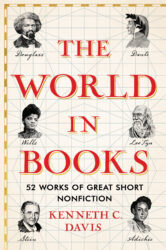
The post “On the Power of Reading”–CBS Mornings Interview first appeared on Don't Know Much.



